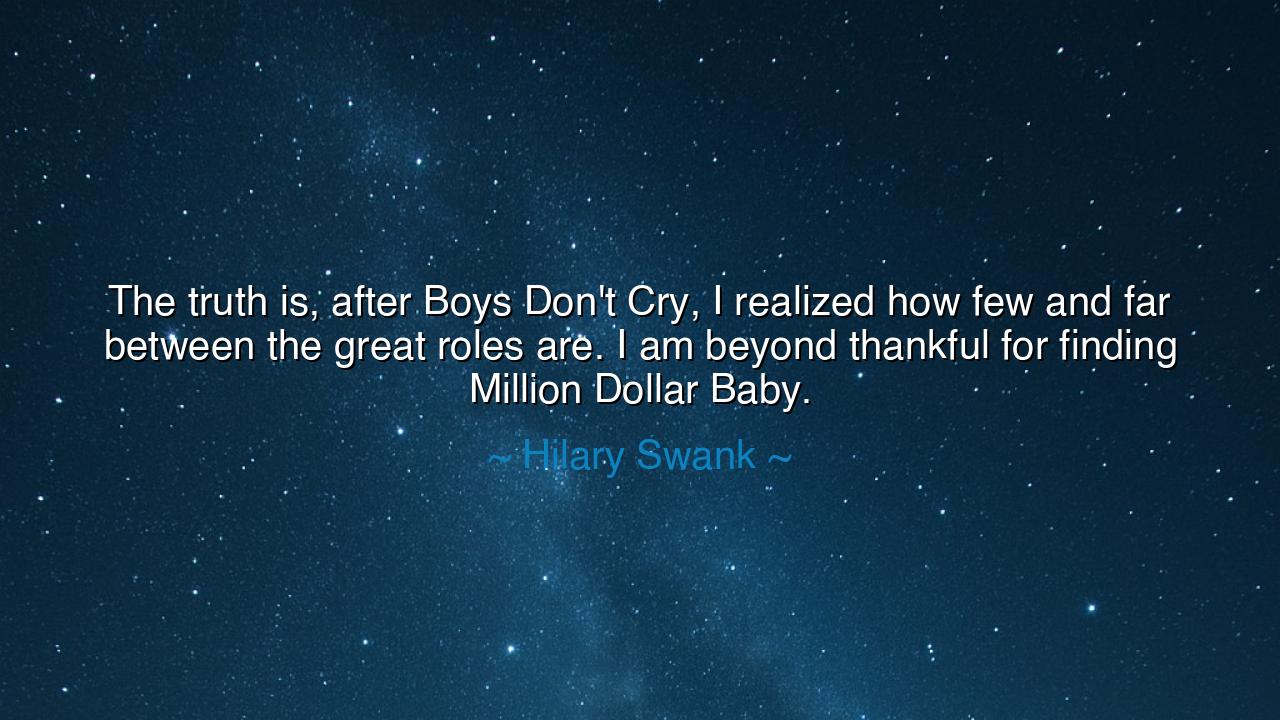
The truth is, after Boys Don't Cry, I realized how few and far
The truth is, after Boys Don't Cry, I realized how few and far between the great roles are. I am beyond thankful for finding Million Dollar Baby.






Hilary Swank, reflecting on the unpredictable path of her vocation, once declared: “The truth is, after Boys Don’t Cry, I realized how few and far between the great roles are. I am beyond thankful for finding Million Dollar Baby.” In these words, there is both the weight of hard-earned wisdom and the radiance of gratitude. She speaks not only of her own craft but of the universal truth that greatness in life—whether in work, art, or purpose—rarely comes easily or often. It must be sought with persistence, and when it is found, it must be cherished with humility.
The origin of her statement lies in her journey as an actress. After Boys Don’t Cry, a role that demanded courage and depth, Swank came face to face with the reality that such transformative opportunities are rare. The artist, no matter how skilled, cannot simply summon greatness at will—it must meet them in the form of the right role, the right moment, the right story. When Million Dollar Baby appeared, it was more than another part—it was a calling, a chance to embody struggle, discipline, and triumph in a way that touched hearts around the world. For this, she was thankful beyond measure.
The ancients knew well this rarity of opportunity. Consider the warrior Achilles, who was offered two paths: a long life in obscurity, or a short one in glory. He seized the rare chance for greatness, knowing it would never come again. Or think of Cicero, whose moment to defend the Republic through his orations came only a handful of times in his long career. Swank’s reflection echoes this same awareness: the recognition that destiny presents only a few true openings in a lifetime, and to step into them requires readiness, courage, and gratitude.
Her gratitude also reveals the humility of one who knows that talent alone is not enough. Many artists wait their entire lives and never meet a role like Maggie Fitzgerald in Million Dollar Baby. For Swank, the role was not a gift to her alone—it was a chance to give something profound to the audience, to embody the universal struggles of perseverance, sacrifice, and the will to rise against all odds. To be thankful here is not only to celebrate her own achievement, but to honor the story, the filmmakers, and the mystery of timing that brought it all together.
There is also a deeper lesson in her words: greatness is not a steady river but a fleeting spring. It is not given in abundance but revealed sparingly. This truth humbles us and teaches us to treasure rare moments. When the artist, the athlete, or the leader is given such an opportunity, they must seize it fully, knowing that it may not come again. Swank’s testimony is not merely personal—it is a teaching to all who strive: when greatness comes, do not hesitate, and when it passes, carry gratitude for having known it at all.
History mirrors this lesson in countless lives. Think of Abraham Lincoln, who spent years in obscurity, defeated in elections and forgotten, until history’s rare hour of trial demanded his voice and leadership. He seized that moment, and the world was changed. So too with Swank: the rare role of Maggie became her crucible, her chance to embody a story larger than herself, and she rose to it with the fullness of her being.
The lesson for us is clear: do not despair if greatness seems distant, for it is never constant. Prepare yourself, sharpen your craft, deepen your soul, so that when the rare moment comes, you will be ready. And when it does, meet it not with pride but with thankfulness. For true greatness is never owned—it is borrowed for a time, entrusted to us, and then returned to the world.
Thus, Hilary Swank’s words stand as a beacon: that rare opportunities must be seized with both courage and humility, and that the proper response to such a gift is not arrogance but profound gratitude. She teaches us that life’s most extraordinary moments come not often, but when they do, they are to be embraced with all the strength of heart, mind, and spirit.






AAdministratorAdministrator
Welcome, honored guests. Please leave a comment, we will respond soon